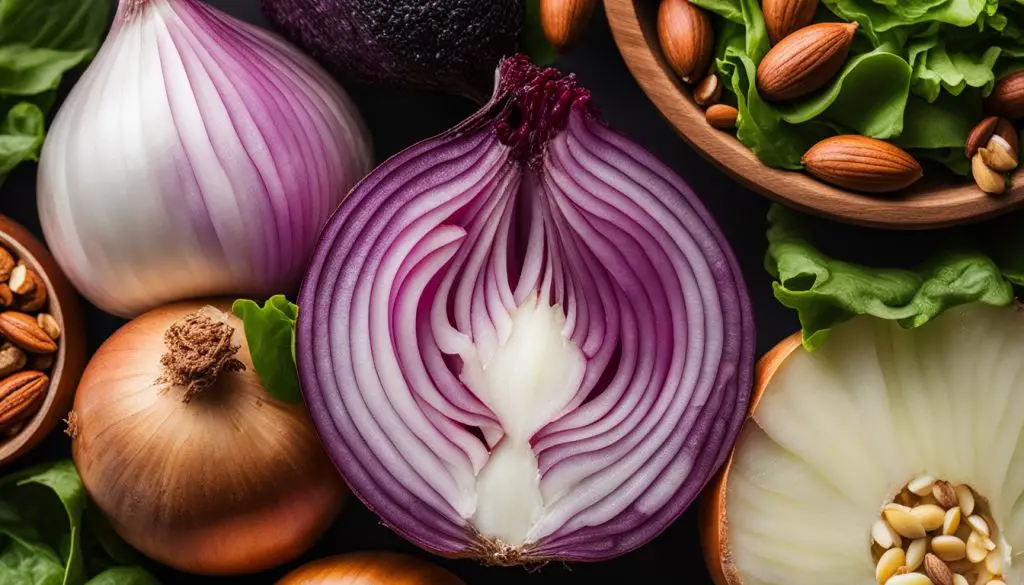Onions are part of the same plant family as garlic, shallots, and leeks. Every year, people eat about 20 pounds of onions per person. They can make meals tasty whether eaten raw, cooked, pickled, or powdered.
Key Takeaways
- Onions are nutrient-dense, providing a range of vitamins, minerals, and antioxidants.
- Eating onions regularly may help prevent heart disease, reduce cancer risk, and regulate blood sugar levels.
- Onions possess antimicrobial properties and can promote digestive health.
- Onions can be enjoyed in various forms, from raw to cooked, pickled, or powdered.
- Moderation is important, as excessive onion consumption may cause digestive issues for some individuals.
The Remarkable Nutritional Profile of Onions
Onions stand out as a top pick for nutrition, brimming with vitamins, minerals, and more health benefits. They are not just known for their strong smell and many uses in cooking. These vegetables are a powerhouse of nutrition.
Packed with Vitamins and Minerals
A 110-gram onion is full of onion vitamins and minerals. It has a good dose of vitamin C, vitamin B6, and folate. You'll also get manganese and antioxidants from this serving. This variety of nutrients makes onions a superfood.
Rich in Antioxidants and Fiber
Onions are famous for their onion antioxidant properties found in flavonoids like quercetin. They protect the body's cells from damage. Another health boost onions offer is their onion fiber content. One onion contains almost 2 grams of fiber. This helps with digestion and keeps you feeling full.
| Nutrient | Amount per Medium Onion (110g) |
|---|---|
| Calories | 44 |
| Protein | 1.2g |
| Carbohydrates | 10.3g |
| Sugar | 4.7g |
| Fiber | 1.9g |
| Fat | 0.1g |
Eating Onions Every day: Potential Health Benefits
Including onions in your meals could do wonders for your health. They help your heart stay healthy and might even lower your cancer risk. Onions are full of nutrients that are good for you.
Heart Disease Prevention
Onions have lots of antioxidants and sulfur compounds. These can lower your cholesterol and lessen the chance of heart problems. Studies show that eating onions often can make your heart work better.
Cancer Risk Reduction
Due to their organosulfur compounds, onions may lower your chance of cancer. These compounds fight cancer cell growth. They also boost your body's defenses against cancer, such as prostate, colon, and stomach cancer.
Blood Sugar Regulation
Onions are low-glycemic and good for keeping your blood sugar in check. The fiber and chromium in them can make your body respond better to insulin. This might help avoid type 2 diabetes.
Bone Health Support
They're also great for your bones, thanks to vitamins and minerals like vitamin C, vitamin K, and manganese. Eating onions often helps keep your bones strong. It may also lower the risk of osteoporosis.
Antimicrobial Properties
Onions can kill harmful stuff like bacteria, fungi, and viruses. The sulfur compounds in onions stop these pathogens from growing. They also help your immune system fight off illnesses.
Digestive Health Promotion
Being a prebiotic food, onions feed the good bacteria in your gut. This is good for digestion and can lower inflammation. Their fiber keeps your bowels moving like they should and keeps your gut healthy.

Conclusion
Onions offer a lot for our health, proving they're more than just a tasty vegetable. They boost heart health, may fight cancer, help control blood sugar, and strengthen our bones. So, by including them in our meals, we can feel better all around.
The nutritional value of onions stands out because they are rich in vitamins, minerals, antioxidants, and fiber. They ease the risk of heart disease and cancer, and they keep your blood sugar level. So, it's wise to eat them daily in any form, raw, cooked, or as powder.
On top of that, onions fight off harmful germs and keep our digestion in check. This makes them an excellent natural option for staying healthy. And, cooking with onions opens up a world of tasty dishes that boost your health. So, consider onions a helping hand in your journey for a healthier lifestyle.

